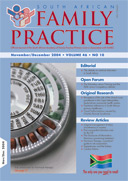Perceptions of the role of the clinical nurse practitioner in the Cape Metropolitan doctor-driven community health centres.
Abstract
Background: The purpose of this study was to evaluate the role of the clinical nurse practitioner (CNP) in a doctordriven primary health care setting. A descriptive study was undertaken, using both a quantitative and a qualitative methodology. The study was undertaken in community health centres (CHC) in the Cape Metropolitan area. Method: A situational analysis was conducted of all 41 CHCs in the Cape Metropolitan area. Three focus group interviews were then undertaken with CNPs, doctors and managers to determine the factors influencing the effective functioning of the CNP. Results: Five-seven percent of the 88 CNPs were totally inactive with regard to consulting patients and only 28% were utilised in a full-time capacity. The major themes to emerge were the factors that determine the effective functioning of the CNP, including self-confidence gained from regular practise, support for their role from doctors and managers, role clarity, and enrolment in the course for the appropriate reason. Conclusions: When enrolling nurses for the CNP course, preference should be given to nurses who will be able to immediately put their training into practise. The managers need to foster a strong CNP identity and ensure maximum opportunities to practise in order for nurses to attain the status of a secure CNP. The doctors need to appreciate the nurses’ value in the multidisciplinary team and offer the necessary support. Furthermore, the nurses’ role needs to be properly conceptualised by policy makers and contextualised at ground level for them to be effectively utilised in a doctor-driven CHC. (SA Fam Pract 2004;46(10): 21-25)
Published
2004-11-01
Section
Original Research
By submitting manuscripts to SAFP, authors of original articles are assigning copyright to the South African Academy of Family Physicians. Copyright of review articles are assigned to the Publisher, Medpharm Publications (Pty) Ltd, unless otherwise specified. Authors may use their own work after publication without written permission, provided they acknowledge the original source. Individuals and academic institutions may freely copy and distribute articles published in SAFP for educational and research purposes without obtaining permission.

